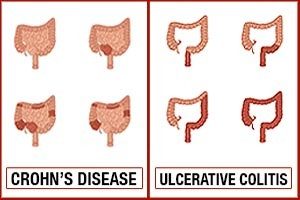 Crohn’s and Colitis Awareness Week runs from December 1 through December 7, so we present articles relating to these inflammatory bowel diseases including the differences and similarities of Crohn’s disease vs. ulcerative colitis, the impact of these chronic conditions on sleep and depression. Although there is currently no cure for neither Crohn’s disease nor colitis, both can be managed with proper medications and treatment.
Crohn’s and Colitis Awareness Week runs from December 1 through December 7, so we present articles relating to these inflammatory bowel diseases including the differences and similarities of Crohn’s disease vs. ulcerative colitis, the impact of these chronic conditions on sleep and depression. Although there is currently no cure for neither Crohn’s disease nor colitis, both can be managed with proper medications and treatment.
Crohn’s disease vs. ulcerative colitis, differences in symptoms, causes, and treatment
Crohn’s disease and ulcerative colitis are part of the group of conditions known as inflammatory bowel diseases (IBD). Prior to the 20th century, before the rise of hygiene and urbanization, inflammatory bowel disease was quite rare. Currently, IBD is found in developed countries and is believed to be caused by a lack of germ resistance development – although the exact cause is still unknown.
Advertisement
For those living with IBDs, their immune system mistakes food and bacteria in the gastrointestinal tract for an allergen or foreign substance, so it sends out cells to destroy it. The result of these attacks is chronic inflammation. Continue reading…
 Crohn’s disease, ulcerative colitis progression and development linked to “creeping fat”: Study
Crohn’s disease, ulcerative colitis progression and development linked to “creeping fat”: Study
Crohn’s disease and ulcerative colitis progression and development have been found to be linked to “creeping fat.” Researcher Charalabos Pothoulakis said, “A well-appreciated feature of IBD [inflammatory bowel disease], especially longstanding Crohn’s disease, is intra-abdominal fat, also known as ‘creeping fat,’ which wraps around the intestine. However, it’s not clear whether this fat is protective or harmful. Our study offers insight into this phenomenon. We found that intra-abdominal fat cells may normally be programmed to dampen inflammation but, in fact, have acquired a tendency to promote inflammation in IBD. Continue reading…
 Crohn’s disease and ulcerative colitis relapse may be triggered by sleep disturbances
Crohn’s disease and ulcerative colitis relapse may be triggered by sleep disturbances
Many people understand the importance of a getting a good night’s sleep, but recent research indicates that two inflammatory bowel diseases, Crohn’s disease and ulcerative colitis could relapse due to sleep disturbances.
Sleep disturbances are associated with absenteeism at work, as well as an increased need for healthcare services. Research shows that it is also closely linked to gastrointestinal (GI) symptoms. These problems could include hypertension or impairment of glucose control, and increased inflammation. While getting back into a normal sleep pattern can often resolve health issues, science tells us that it is different with IBD and sleep. With IBD or inflammatory bowel disease, such as Crohn’s disease and ulcerative colitis, symptoms often worsen when there are sleep disturbances. Continue reading…
 Crohn’s disease, ulcerative colitis tied to anxiety and depression
Crohn’s disease, ulcerative colitis tied to anxiety and depression
Crohn’s disease and ulcerative colitis – both gastrointestinal diseases – have been tied to anxiety and depression. In a previous study researchers found that not only is Crohn’s disease tied to depression but that depression can increase inflammatory flare-ups related to Crohn’s.
Advertisement
The study involved 3,150 Crohn’s patients who completed online questionnaires in regards to their disease, treatment and its affect on their daily lives. Patients were also asked how often they felt sad, hopeless, or worthless. Continue reading…
 Inflammatory bowel disease (IBD) linked to diversity of viruses and gut bacteria
Inflammatory bowel disease (IBD) linked to diversity of viruses and gut bacteria
Inflammatory bowel disease (IBD) is linked to diversity of viruses and gut bacteria. The findings come from researchers at the Washington University School of Medicine. The researchers found that patients with inflammatory bowel disease had a greater variety of viruses in their digestive system compared to healthy volunteers, suggesting that viruses may play a role in inflammatory bowel diseases.
Research has revealed that changes to the gut microbiome are associated with obesity, diabetes, metabolic syndrome, and inflammatory bowel disease. The latest research is the first to find a link between inflammatory bowel disease and changes to viruses in the human body and their genes. The researchers suggest that the results may indicate that viruses have an unrecognized role in obesity and diabetes, as well as inflammatory bowel diseases like Crohn’s disease and ulcerative colitis. Continue reading…
